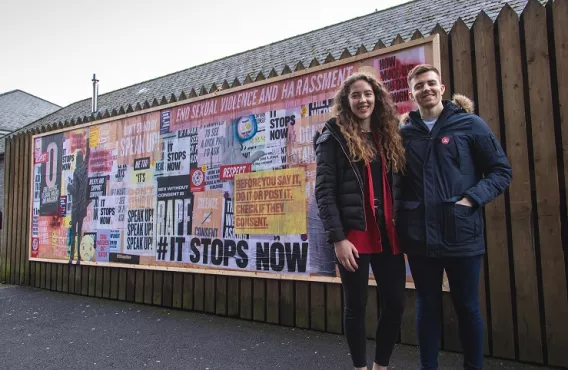
There can be no mistaking the fact that incidents of sexual assault on the campuses of higher education institutions in Ireland are grossly underreported.
As illustrated by the SEXUAL EXPERIENCES SURVEY 2020 launched this week – we know that the number of official complaints of sexual assault made every year in no way reflects the reality or the frequency of sexual assault or harassment that students may have encountered either at UL or on any other HEI campus.
Over the past number of years at University of Limerick there has been a focus, not only on continuing to provide a safe environment for all our students and staff, but also on putting supports in place to encourage victims of any kind of discriminatory or abusive behaviour (including sexual assault or harassment) to make an official report.
It has meant that we have had a small increase in reported cases but the number still does not reflect the reality and we will continue to do more to support our students in reporting any instance of any kind of discriminatory or abusive behaviour (including sexual assault or harassment).
This can be a very sensitive issue for victims and we have many support structures in place for any student who is seeking assistance, from our UL Student Life Officers to our Chaplaincy Office, our Counselling and Health services, course leaders and peers.
Unfortunately, most victims of sexual assault or harassment do not wish to make official complaints and so it is difficult to get a full picture of the size of the problem on any Irish higher education campus. This is something we must and will change at UL and indeed should be encouraged at all universities.
The Sexual Health and Wellbeing (SHW) Group was established as part of the Healthy UL Framework launched in 2019 and is currently developing a UL Sexual Health and Wellbeing Policy, including a protocol for crisis situations. This policy will be in line with the recently published National Consent Framework for Higher Education.
In order to further enhance the security of our students and staff, we have installed six dedicated emergency call point pillars at locations around the campus.
They come with built-in strobe lights and in the event of the call button being pushed, the caller will be immediately connected with a member of the Campus Security Control Room.
Emergency Beacons are a familiar sight on campuses across the world and have been found to promote a feeling of security and safety among university communities.
Smart Consent
UL provides voluntary Smart Consent workshops/training for every incoming student - in the coming semester these will take the form of Virtual Consent Workshops, developed by NUIG’s Active Consent Group to as many first year students as possible during Orientation Week.
These workshops will be facilitated by trained UL Student Life Officers and UL Staff and students. The SHW Group also plan to roll out the on-line BYSTANDER PROGRAMME developed by UCC to a pilot group in Semester 2.
Report and Support
UL will have Report and Support in place in the autumn as part of a consortium to provide students with the means to anonymously report sexual misconduct, sexual harassment and all other forms of unacceptable behaviour including racism, homophobia etc. The hope is that the data provided from the reporting system will provide a broader picture of sexual violence on college campuses.
UL continues to advocate for action against sexual harassment nationally. The University has contributed to the development of the National Framework for Consent in Higher Education Institutions: Safe, Respectful, Supportive and Positive – Ending Sexual Violence and Harassment in Irish Higher Education Institutions. This was launched by Minister Mary Mitchell O’Connor on April 5.
UL also contributed to the ESHTE project - Ending Sexual Harassment and Violence in Third-level Education - led by the National Women’s Council.
Earlier in 2019, UL worked with UL Student Life on the #ItStopsNow campaign which saw the installation of a large mural on campus calling for the end to sexual violence and harassment in third-level institutes. The mural depicts a number of messages aiming to dispel popular myths and engrained attitudes towards sexual violence and harassment. This was supported by an online and social media campaign to spread the message from the UL institutional accounts.
Also last year a groundbreaking and award winning LGBT+ public education and awareness campaign was jointly rolled out by the University of Limerick’s Hate and Hostility Research Group and the Transgender Equality Network Ireland (TENI). ‘Call It Out’ is an initiative that seeks to shine a bright light on the sometimes visible, often hidden phenomena of homophobia, biphobia and transphobia and the corresponding impact on Ireland’s LGBT+ community.
We want UL to be a safe and healthy campus. In the past number of years, CCTV coverage has been increased across the campus and security patrols have also increased. We are engaged in a longer-term project to foster healthy lifestyles among UL students and regularly support our UL Student Life organisation in ensuring the language around sexual health is part of everyday conversations among our students.
We provide sexual health education programmes, sexual health screening programmes, and support the UL Student Life with UL SHAG (Sexual Health and Guidance Week) every year. However, we must do more and tackle some of the behaviours that aggravate sexual harassment, such as excessive alcohol consumption on and off campus, a difficult issue but one we must face up to in our Healthy UL programme.
UL understands that it has a duty of care to students and staff and works hard to ensure the campus is safe and inclusive. It has many measures and policies in place to foster and support diversity in all of its forms. However, policies are not enough – the UL community must get behind the movement to stop sexual harassment and assault and to help its victims.
